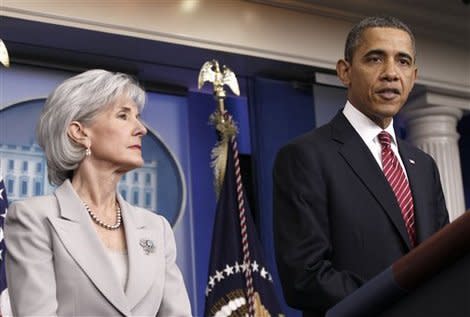Obama Reaches Compromise Over Contraception Law. Will This Satisfy the Critics?

In spite of a revised rule announced Friday that would allow non-religious institutions that are run by religious organizations to avoid providing or paying for their employees' contraception, some Congressional Republicans insist that the Obama administration is still violating on religious freedoms by mandating that prescription birth control be made available without a copayment.
"This ObamaCare rule still tramples on Americans' First Amendment right to freedom of religion," Republican Representative Jim Jordan of Ohio said in a written statement. "It's a fig leaf, not a compromise. Whether they are affiliated with a church or not, employers will still be forced to pay an insurance company for coverage that includes abortion-inducing drugs."
Catholic church leaders have insisted that they would never go along with the law, but they'd never have to: Churches and other places of worship have always been exempt from the mandate.
According to the revised rule, religious charities, hospitals, universities, and other institutions will be able to offer their employees a health care plan that does not include contraception; insurance companies instead will be required to offer those employees contraception coverage directly and without a co-pay, bypassing their employers. It's a change from the decision made in January, which gave these types of organizations a year to comply with that provision in the Affordable Care Act.
"The result will be that religious organizations won't have to pay for these services, and no religious institution will have to provide these services directly," President Barack Obama said in a press conference. "Religious liberty will be protected and a law that requires free preventative care will not discriminate against women."
Republican Representative Fred Upton of Michigan told CNN that Friday's announcement "simply pretends to shift costs away from religious employers, but it doesn't fix the problem and is another call for individuals and institutions to compromise on principle." He still wants Congress to eliminate the law entirely, something that Republican House Speaker John Boehner had vowed to work toward earlier this week.
"The administration has simply reaffirmed that congressional action to permanently reverse this mandate is necessary," Upton said.
At the Conservative Political Action conference on Friday, GOP presidential candidate Rick Santorum said the decision is "not about contraception. It's about economic liberty. It's about freedom of speech. It's about freedom of religion. It's about government control of your lives. And it's got to stop."
"This is not a women's rights issue," insisted New Hampshire Republican Senator Kelly Ayotte earlier this week. "This is a religious liberty issue."
Whatever the issue is, it is not a new one.
The federal government has required non-religious institutions run by religious groups to offer birth control coverage since December 2000, and 28 states already have laws on the books requiring the same. In fact, the Department of Health and Human Services modeled their "new" mandate on those existing laws; the only change made by the Obama administration was to require that the co-payment be eliminated.
"Now millions more women and families are going to have access to essential health care coverage at a cost that they can afford," Sarah Lipton-Lubet, policy counsel with the ACLU, told National Public Radio. "But as a legal matter, a constitutional matter, it's completely unremarkable."
As before, churches and other places of worship are still exempt under the revised the law. But hospitals, charities, universities, and other institutions run by religious groups have to comply, because they serve and employ people of different faiths.
"When a religious organization chooses to hire nonbelievers, it must, at least to some degree, be prepared to accept neutral regulations imposed to protect those employees' legitimate interests in doing what their own beliefs permit," New York Supreme Court justices ruled in 2006, after Catholic Charities and other religious groups claimed that the state's contraceptive law discriminated against them.
Though some politicians have vowed to continue to work to rescind the rule and religious leaders seemed to reserve judgement about the decision, a key Catholic group praised the administration for the revision.
"The Catholic Health Association is very pleased with the White House announcement that a resolution has been reached that protects the religious liberty and conscience rights of Catholic institutions," Sister Carol Keehan, Director and CEO of the Catholic Health Association, said in a statement. "The framework developed has responded to the issues we identified that needed to be fixed. We are pleased and grateful that the religious liberty and conscience protection needs of so many ministries that serve our country were appreciated enough that an early resolution of this issue was accomplished. "
According to senior officials in the Obama administration, the revision was crafted to satisfy two core requirements: That women who want or access to prescription birth control or who need it to treat medical issues, such as endometriosis, will be able to get it free of charge, and that religious employers who object to contraception for moral reasons will not have to provide it, refer women to it, or pay for it.
"Whether you're a teacher, or a small businesswoman, or a nurse, or a janitor, no woman's health should depend on who she is or where she works or how much money she makes," Obama said. With the new rule in place, "Religious liberty will be protected, and a law that requires free preventive care will not discriminate against women."
Copyright © 2012 Yahoo Inc.
Also on Shine:
Romney on birth control decision: It's wrong for Obama in 2012, but right for Romney in 2005?
Susan G. Komen and Planned Parenthood: Why the controversy will continue
Prescription birth control to be covered without a co-payment: What that really means for you
